Reference Letter For University
[Your Name]
[Your Address]
[City, State, Zip Code]
[Email Address]
[Phone Number]
[Today's Date]
[University Name]
[Admissions Office]
[University Address]
[City, State, Zip Code]
Dear Admissions Committee,
I am writing this letter in enthusiastic support of [Student's Full Name], who has applied to [University Name] for admission to pursue [Intended Program of Study]. As their [teacher/mentor/supervisor], I have had the privilege of closely observing [Student's Name] and have no hesitation in recommending them for admission to your esteemed university.
I have known [Student's Name] for [duration of the relationship], during which time they have consistently demonstrated exceptional academic abilities, strong character, and a genuine passion for learning and personal growth. As an active and engaged member of our academic community, [Student's Name] has stood out for the following qualities:
1. Academic Excellence: [Student's Name] has consistently been at the top of their class, showcasing outstanding academic performance in a diverse range of subjects. Their dedication to learning is evident in their commitment to research, critical thinking, and problem-solving abilities.
2. Intellectual Curiosity: [Student's Name] possesses a thirst for knowledge and actively seeks out opportunities to expand their horizons. They frequently engage in extra-curricular reading and academic pursuits beyond the classroom requirements, which is a testament to their genuine passion for education.
3. Leadership and Initiative: [Student's Name] has actively taken on leadership roles within our school/community, displaying excellent organizational and interpersonal skills. Their ability to collaborate with others and inspire their peers has resulted in successful projects and events.
4. Strong Work Ethic: [Student's Name] consistently demonstrates a strong work ethic and resilience when facing challenges. They are not afraid to take on difficult tasks and consistently strive for excellence in everything they do.
5. Integrity and Character: [Student's Name] is a person of high moral character, demonstrating honesty, empathy, and respect towards their peers and teachers. They are well-respected by their peers and serve as a positive role model for others.
6. Extracurricular Activities: In addition to their academic achievements, [Student's Name] has actively participated in various extracurricular activities, such as [mention specific clubs, sports, volunteering, or any notable achievements].
Based on these attributes, I have no doubt that [Student's Name] will make significant contributions to the academic and social fabric of [University Name]. They possess the intellectual and personal qualities necessary to thrive in a challenging academic environment and actively contribute to the university community.
I wholeheartedly recommend [Student's Name] for admission to [University Name] and believe they have the potential to excel both academically and personally. If you have any further questions or require additional information, please feel free to contact me at [your email address/phone number].
Thank you for considering this recommendation. I am confident that [Student's Name] will make you proud as a valuable member of your university community.
Sincerely,
[Your Name]
[Your Title/Position (if applicable)]
[Your Institution (if applicable)]
Professional University Reference Letter
Dear Admissions Committee,
I am writing to provide a strong recommendation for [Student Name] as they apply to [University Name]. Having taught [Student Name] in [Course/Subject] for the past [X] years, I have witnessed their exceptional intellectual abilities, strong work ethic, and dedication to learning.
[Student Name] consistently demonstrates critical thinking skills, collaborative teamwork, and leadership qualities that will greatly benefit your academic community. I am confident that they will excel in your rigorous program and make meaningful contributions both inside and outside the classroom.
Please feel free to contact me if you require any further information.
Sincerely,
[Your Name]
[Title/Position]
Heartfelt Email Reference for University Scholarship
Dear Scholarship Committee,
I am delighted to recommend [Student Name] for the [Scholarship Name]. Over the past few years, I have seen [Student Name] grow into an inspiring, compassionate, and highly motivated individual. Their commitment to academics, extracurricular activities, and community service is truly remarkable.
I wholeheartedly support their application and am confident they will continue to shine as a positive force in your university community.
Warm regards,
[Your Name]
[Title/Role]
Casual Teacher Recommendation Email
Hello [Admissions Team],
I wanted to quickly share my support for [Student Name]'s application to [University Name]. As their teacher for [Subject], I’ve watched them grow into a confident, curious, and capable student.
They handle challenges with creativity and determination, and I’m certain they’ll thrive in your program. Feel free to reach out if you want any more insights about their abilities.
Best,
[Your Name]
Provisional / Preliminary University Reference Letter
Dear [Admissions Officer],
This letter serves as a preliminary recommendation for [Student Name], pending full documentation. Based on their current performance in [Course/Project], I can affirm that they demonstrate strong analytical skills, initiative, and dedication to their academic growth.
A detailed reference will follow once additional achievements are documented.
Sincerely,
[Your Name]
[Title/Position]
Creative Arts Program Recommendation Letter
Dear Admissions Committee,
It is my pleasure to recommend [Student Name] for the [Creative Program Name] at [University Name]. Their innovative approach to [Art Form] and willingness to experiment with new ideas make them stand out among peers.
Beyond their creativity, [Student Name] shows commitment, discipline, and a strong collaborative spirit, making them an ideal candidate for your program.
Best regards,
[Your Name]
[Title/Role]
Formal Email Reference for Graduate Admission
Dear Graduate Admissions Committee,
I am writing to formally recommend [Student Name] for admission to [Graduate Program] at [University Name]. Over the course of [X] semesters, I have observed their exceptional analytical abilities, dedication to research, and strong academic performance.
[Student Name] consistently demonstrates professionalism, curiosity, and the ability to work independently, qualities essential for success at the graduate level.
Sincerely,
[Your Name]
[Title/Department]
Informal Recommendation Message for Online Submission
Hi [Admissions Team],
I just wanted to recommend [Student Name] for your program. They’ve been an outstanding student in my [Course] class, showing creativity, persistence, and a positive attitude.
I believe they will thrive at [University Name] and contribute meaningfully to campus life.
Thanks,
[Your Name]
What is a Reference Letter for University and Why It Matters
- A reference letter is a formal document written to endorse a student’s application to a university.
- Its purpose is to provide insights into the student’s academic performance, character, and potential.
- Helps admissions committees assess qualities not visible in transcripts or test scores, like leadership, creativity, and personal integrity.
- Serves as proof of credibility and strengthens the application.
Who Should Write a University Reference Letter
- Teachers or professors familiar with the student’s academic work.
- Employers or supervisors in internships or relevant work experience.
- Mentors, club advisors, or community leaders who know the student personally.
- Preferably someone with direct experience of the student’s achievements and capabilities.
Whom Should the Letter Be Addressed To
- Admissions committees of the university or specific department.
- Scholarship committees, if applying for financial aid or awards.
- Use general salutations like “Dear Admissions Committee” if the specific person is unknown.
- Avoid addressing letters too casually; maintain professional tone.
When Should You Send or Request a Reference Letter
- During application submission deadlines for universities or scholarships.
- For graduate school, professional programs, or special academic initiatives.
- When required for provisional or early decision applications.
- Prior to internships or programs that require academic endorsement.
How to Write and Send a University Reference Letter
- Begin with a clear subject and salutation.
- Introduce yourself and your relationship to the student.
- Highlight key achievements, skills, and personal qualities.
- Provide specific examples of work or behavior that illustrate these qualities.
- Conclude with a strong recommendation and offer for further contact.
- Choose the mode of sending: Email for digital submissions, Letter for print.
- Proofread for clarity, grammar, and professional tone.
How Many Reference Letters Are Typically Required
- Most universities require 2–3 letters per application.
- Some specialized programs may request up to 5.
- Scholarship applications often require at least one strong reference.
- Always check each university’s requirements before submission.
Requirements and Prerequisites Before Writing a Reference Letter
- Collect the student’s resume, transcripts, and personal statement.
- Understand the program’s criteria and values.
- Ensure the student has provided consent to share their information.
- Clarify submission deadlines and method (email, portal, printed letter).
- Prepare notes on the student’s achievements to make the letter specific and credible.
Formatting Guidelines for University Reference Letters
- Length: 1–2 pages (approximately 300–500 words).
- Tone: professional, heartfelt, or formal depending on relationship.
- Style: structured with introduction, body, and conclusion.
- Wording: specific, descriptive, and personalized; avoid vague phrases.
- Attachments: include any forms or documentation required by the university.
- Etiquette: sign the letter, include contact information, and maintain confidentiality.
Pros and Cons of Writing a University Reference Letter
- Pros:
- Strengthens the student’s application.
- Demonstrates the recommender’s engagement and credibility.
- Can highlight achievements not visible in grades.
- Cons:
- Time-consuming to write well.
- Risk of providing overly generic or weak recommendations.
- Can create responsibility for accuracy and honesty.
Common Mistakes to Avoid in University Reference Letters
- Using vague or generic statements without examples.
- Failing to align the letter with the program’s requirements.
- Exceeding word limits or writing too brief a letter.
- Forgetting to proofread, causing grammatical errors.
- Ignoring submission guidelines or deadlines.
Elements and Structure of an Effective Reference Letter
- Opening/Salutation
- Introduction of recommender and relationship to student
- Student’s academic and personal achievements
- Specific examples illustrating strengths
- Conclusion with recommendation
- Contact information for follow-up
- Optional: attachments or supporting documents
Tips and Tricks for a Strong University Reference Letter
- Start early to allow enough drafting and revision.
- Customize each letter to the specific program or scholarship.
- Include quantitative or concrete achievements if possible.
- Balance professional achievements with personal qualities.
- Maintain honesty; avoid exaggeration.
- Keep a copy for reference in case follow-up is needed.
Does a University Reference Letter Require Attestation or Authorization?
- Typically, a reference letter does not need formal attestation.
- However, some universities may require the letter to be on official letterhead.
- Certain scholarship or governmental programs may request notarization or verification of authenticity.
- Always check specific guidelines before submission.

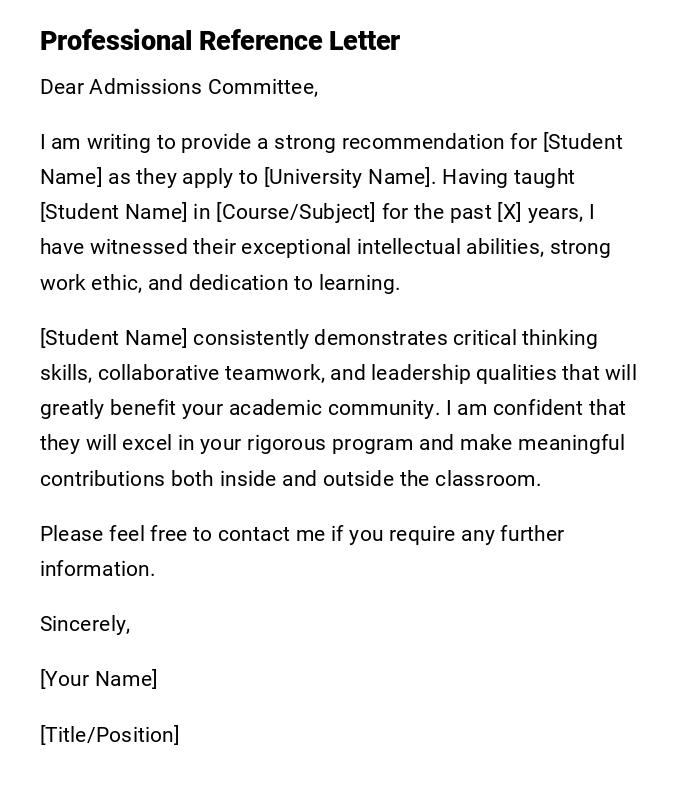
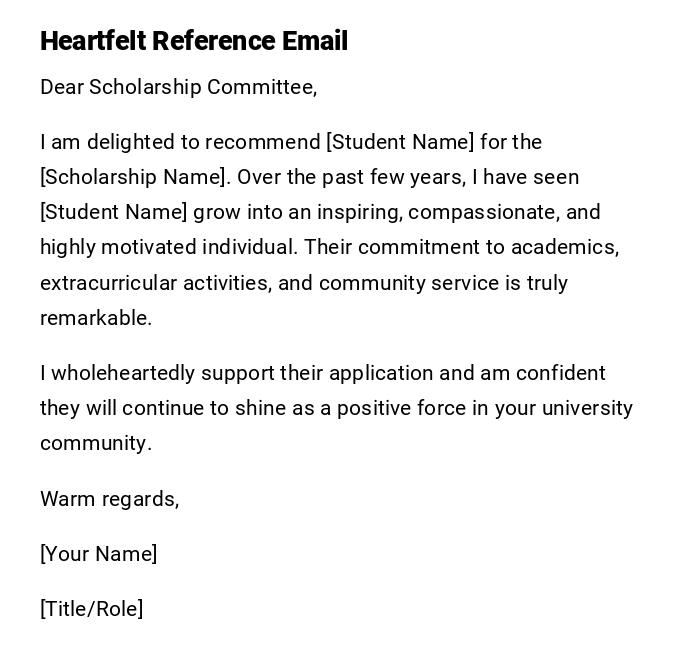
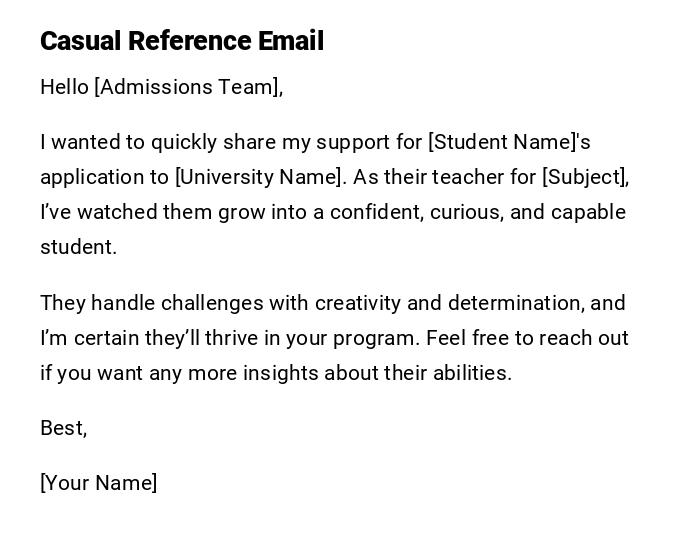
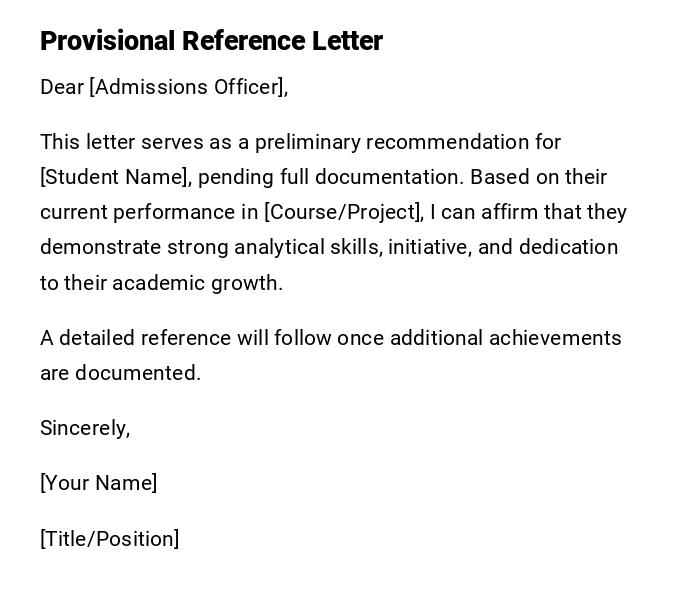
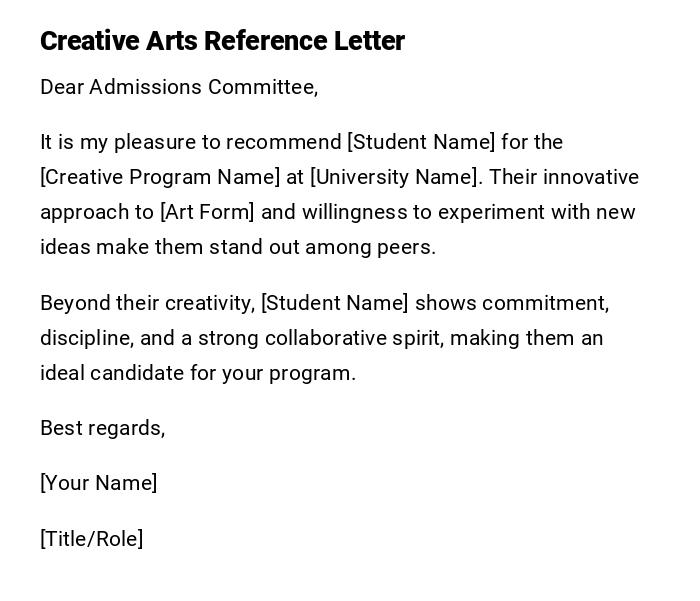
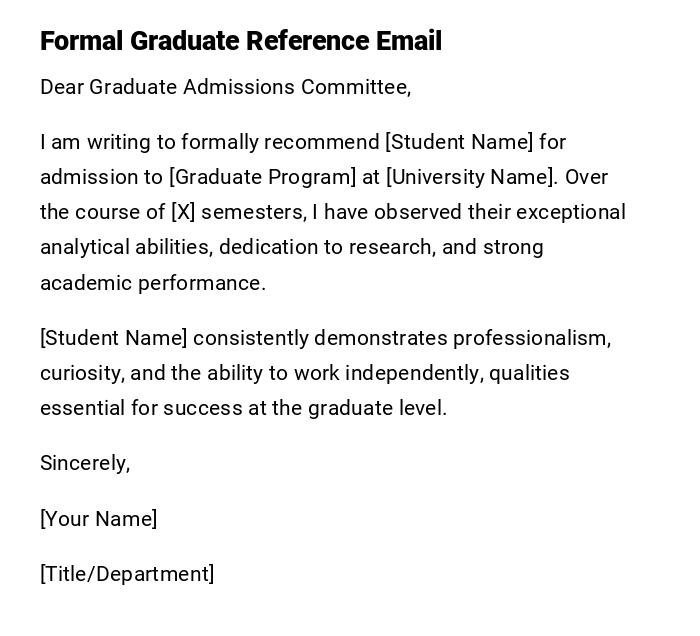
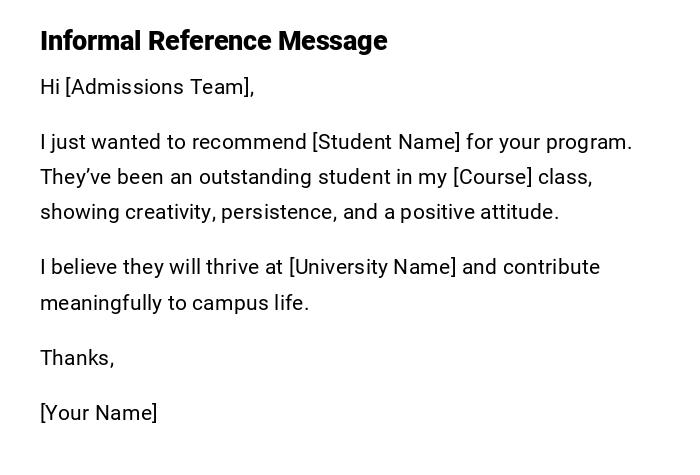

 Download Word Doc
Download Word Doc
 Download PDF
Download PDF